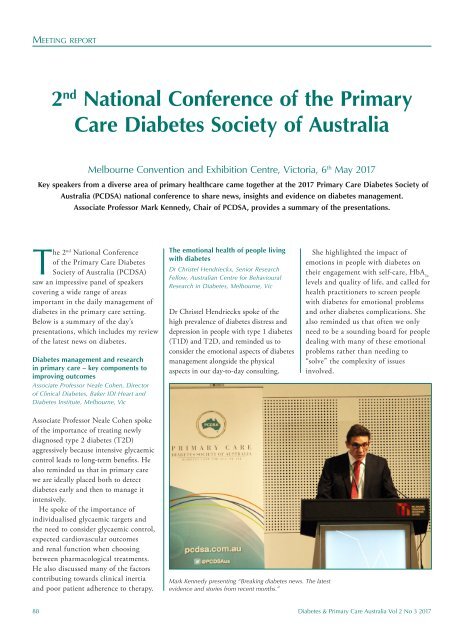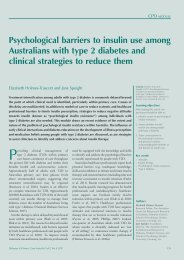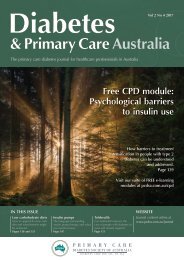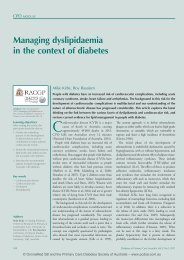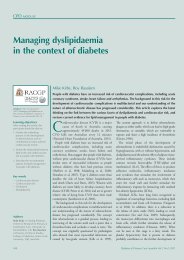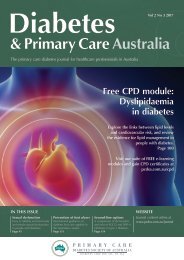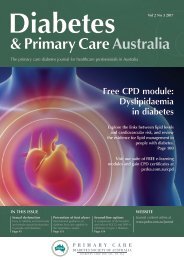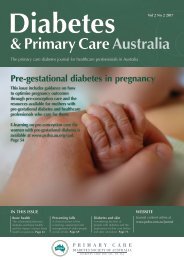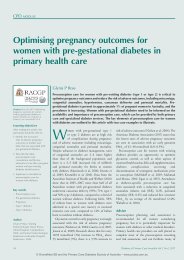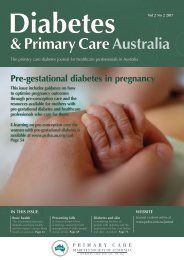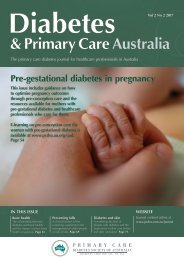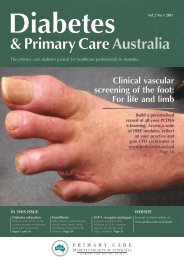DPCA 2-3_entire_v3
Create successful ePaper yourself
Turn your PDF publications into a flip-book with our unique Google optimized e-Paper software.
Meeting report<br />
2 nd National Conference of the Primary<br />
Care Diabetes Society of Australia<br />
Melbourne Convention and Exhibition Centre, Victoria, 6 th May 2017<br />
Key speakers from a diverse area of primary healthcare came together at the 2017 Primary Care Diabetes Society of<br />
Australia (PCDSA) national conference to share news, insights and evidence on diabetes management.<br />
Associate Professor Mark Kennedy, Chair of PCDSA, provides a summary of the presentations.<br />
The 2 nd National Conference<br />
of the Primary Care Diabetes<br />
Society of Australia (PCDSA)<br />
saw an impressive panel of speakers<br />
covering a wide range of areas<br />
important in the daily management of<br />
diabetes in the primary care setting.<br />
Below is a summary of the day’s<br />
presentations, which includes my review<br />
of the latest news on diabetes.<br />
Diabetes management and research<br />
in primary care – key components to<br />
improving outcomes<br />
Associate Professor Neale Cohen, Director<br />
of Clinical Diabetes, Baker IDI Heart and<br />
Diabetes Institute, Melbourne, Vic<br />
The emotional health of people living<br />
with diabetes<br />
Dr Christel Hendrieckx, Senior Research<br />
Fellow, Australian Centre for Behavioural<br />
Research in Diabetes, Melbourne, Vic<br />
Dr Christel Hendrieckx spoke of the<br />
high prevalence of diabetes distress and<br />
depression in people with type 1 diabetes<br />
(T1D) and T2D, and reminded us to<br />
consider the emotional aspects of diabetes<br />
management alongside the physical<br />
aspects in our day-to-day consulting.<br />
She highlighted the impact of<br />
emotions in people with diabetes on<br />
their engagement with self-care, HbA 1c<br />
levels and quality of life, and called for<br />
health practitioners to screen people<br />
with diabetes for emotional problems<br />
and other diabetes complications. She<br />
also reminded us that often we only<br />
need to be a sounding board for people<br />
dealing with many of these emotional<br />
problems rather than needing to<br />
“solve” the complexity of issues<br />
involved.<br />
Associate Professor Neale Cohen spoke<br />
of the importance of treating newly<br />
diagnosed type 2 diabetes (T2D)<br />
aggressively because intensive glycaemic<br />
control leads to long-term benefits. He<br />
also reminded us that in primary care<br />
we are ideally placed both to detect<br />
diabetes early and then to manage it<br />
intensively.<br />
He spoke of the importance of<br />
individualised glycaemic targets and<br />
the need to consider glycaemic control,<br />
expected cardiovascular outcomes<br />
and renal function when choosing<br />
between pharmacological treatments.<br />
He also discussed many of the factors<br />
contributing towards clinical inertia<br />
and poor patient adherence to therapy.<br />
Mark Kennedy presenting “Breaking diabetes news. The latest<br />
evidence and stories from recent months.”<br />
88 Diabetes & Primary Care Australia Vol 2 No 3 2017


